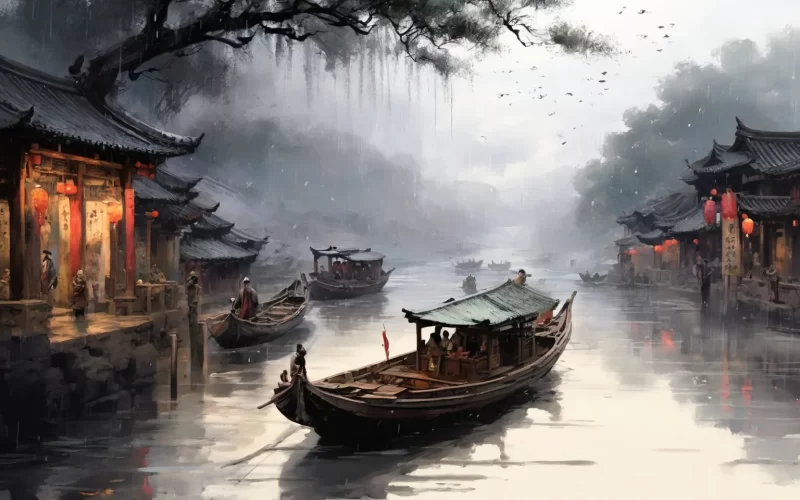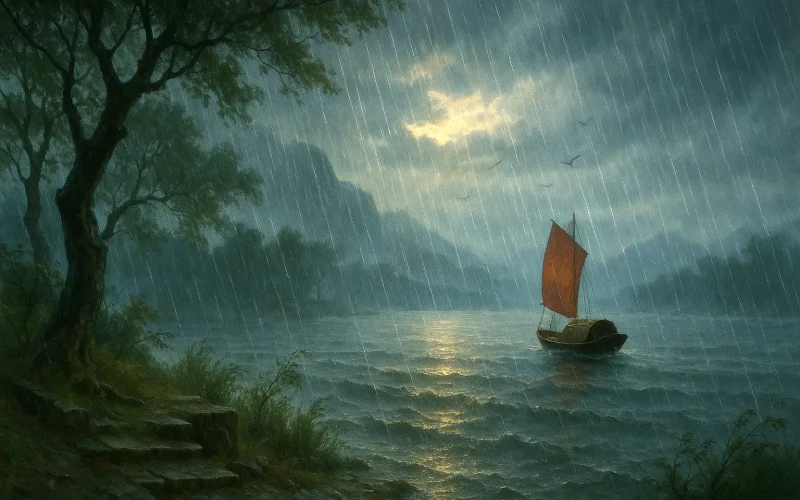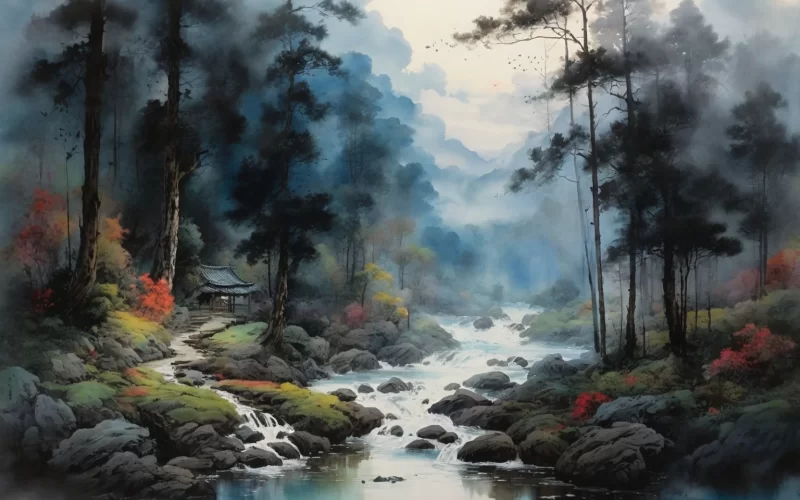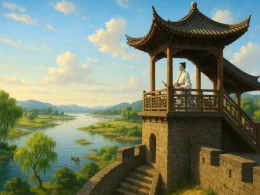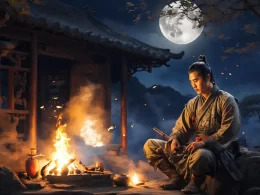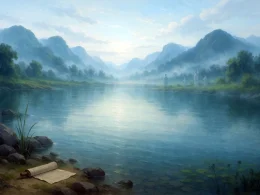Where tender grasses rim the stream
And deep boughs trill with mango-birds,
On the spring flood of last night's rain
The ferry-boat moves as though someone were poling.
Original Poem
「滁州西涧」
韦应物
独怜幽草涧边生,上有黄鹂深树鸣。
春潮带雨晚来急,野渡无人舟自横。
Interpretation
Composed in 781 AD during Wei Yingwu's tenure as governor of Chuzhou, this poem was inspired by his excursions to the mountain streams west of the city. Written during a spring evening, it expresses the poet's serene temperament and reclusive ideals through natural imagery, while subtly revealing his unfulfilled political aspirations. This work stands among the finest examples of Tang landscape poetry.
First Couplet: "独怜幽草涧边生,上有黄鹂深树鸣。"
Dú lián yōu cǎo jiàn biān shēng, shàng yǒu huánglí shēn shù míng.
Alone I cherish streamside grasses growing unseen, While golden orioles sing from leafy green.
The phrase "alone I cherish" (独怜) crystallizes Wei's aesthetic preference for solitude over worldly splendor. The "unseen grasses" (幽草) symbolize his withdrawn yet virtuous character, thriving in obscurity. Contrasting this visual tranquility, the orioles' song introduces auditory vitality, creating dynamic equilibrium between stillness and movement that mirrors Wei's harmonious withdrawal from society.
Second Couplet: "春潮带雨晚来急,野渡无人舟自横。"
Chūn cháo dài yǔ wǎn lái jí, yě dù wú rén zhōu zì héng.
Spring tides with evening rain come rushing by, At the wild ferry - no man, just boats lying.
The scene shifts from mountain stream to turbulent waters. The "rushing" (急) spring tide embodies nature's sudden energy, while the "wild ferry's" (野渡) deserted boat resting sideways ("just boats lying" 舟自横) suggests abandonment to circumstance. This potent image becomes Wei's self-portrait - an official neither advancing in career nor fully retreating, left to drift like the untethered vessel.
Holistic Appreciation
In twenty-eight characters, Wei constructs a layered spring landscape progressing from stream grasses to forest birds, then surging tides to deserted ferries. His deliberate focus on "lonely" elements - unseen vegetation, unpeopled crossings - reveals a spirit disenchanted with worldly pursuits. While ostensibly depicting scenery, each image carries emotional weight, achieving the classical ideal where "scene embodies feeling, feeling contains truth." The poem's power lies in this seamless fusion of observation and introspection.
Artistic Merits
The poem masters "dynamic stillness" - using active natural phenomena to convey contemplative depth. Ordinary images ("unseen grasses," "deserted boat") resonate with philosophical significance through Wei's selective vision. Its language, deceptively simple yet profoundly allusive, represents the Tang aesthetic of refined plainness. Structurally, the alternation between constrained couplets and expansive imagery creates rhythmic tension like the surging tides themselves, making this a masterpiece of controlled expression.
Insights
Wei's poem models how to maintain spiritual clarity amidst life's turbulence. His simultaneous detachment from and engagement with the world - admiring solitude yet acknowledging inevitable currents - speaks to modern struggles for authenticity. The deserted ferryboat particularly resonates today: an emblem of surrendering to forces beyond our control while preserving inner stillness. This Tang dynasty wisdom reminds us that true peace comes not from escaping circumstance, but from finding anchorage within.
Poem translator
Kiang Kanghu
About the poet
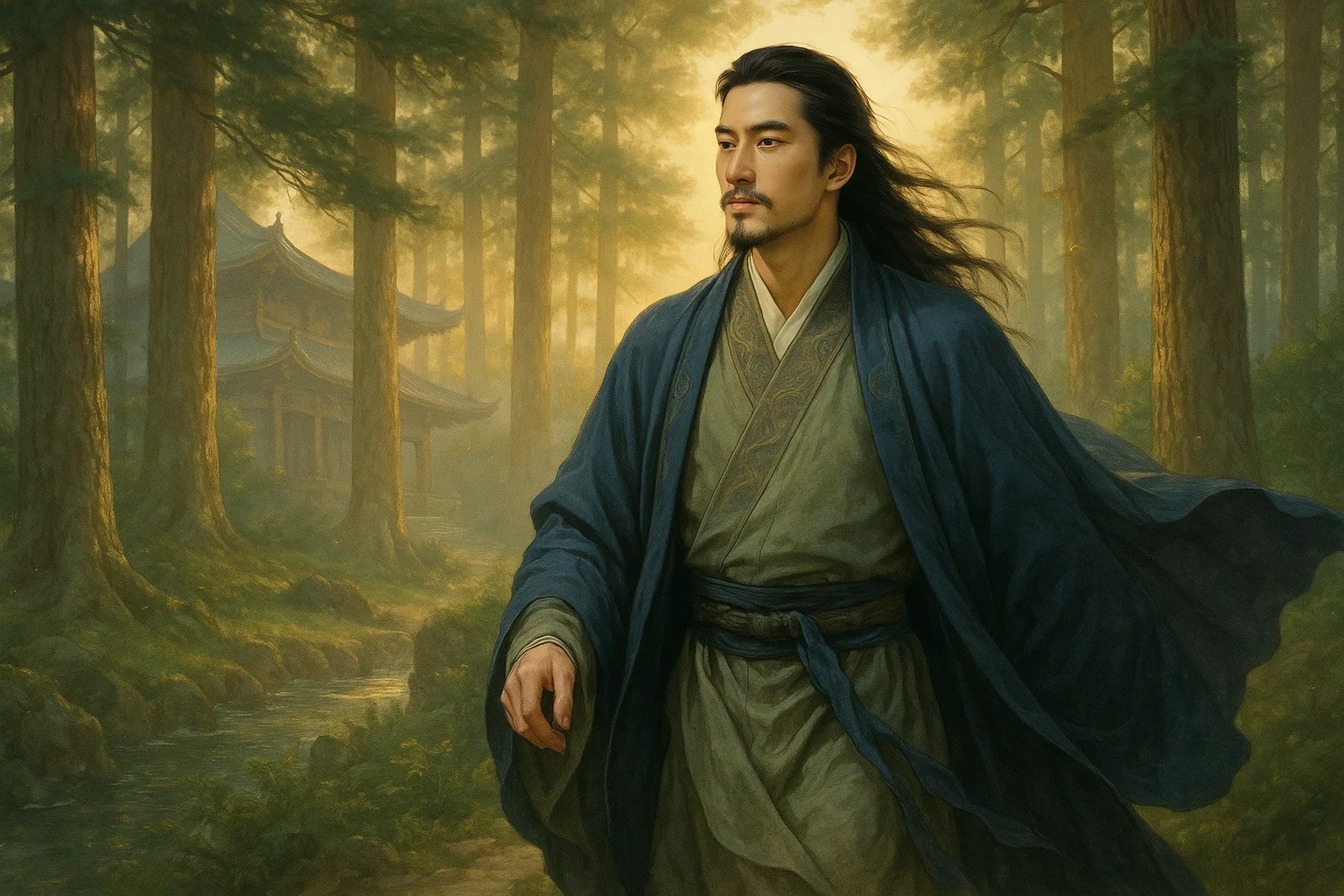
Wei Yingwu (韦应物), circa 737 - 786, was a native of Chang'an, Beijing. His poems were collected in the Wei Suzhou Collection, which included poems concerned with the plight of the people, expressions of disobedience to the times and indignation against the world, and descriptions of idyllic landscapes, etc., of which the ones describing idyllic landscapes are the most famous, and have been sung by posterity in particular.






